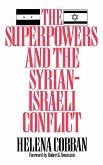The Middle Eastern problem is suffused with emotion and ignorance. It is both good and important to have Cobban's perceptive and cool dissection of a truly complex issue. Zbigniew Brezezinski Counselor, Center for Strategic and International Studies Former National Security Adviser Middle East analyst Cobban's 'historical case study of how things were in the Israel-Syria theater during the years 1978-1989' was largely completed before Iraq's invasion of Kuwait, but the events of the past year make this book more, rather than less, relevant. . . . Cobban's focus, then, on these two heavily armed nations and their superpower relationships could hardly be more timely. Booklist In the coalition war against Iraq following its invasion of Kuwait, the participation of Syria in the U.S.-led coalition and the restraint of Israel were important elements in the quick and successful conclusion of the war. The United States' diplomatic and military resolve, as well as the withdrawal of the Soviet Union from the international arena, helped put Syria and Israel on the same side in this effort. This was a surprising development in light of the strained state of Syrian-Israeli relations in the years leading up to 1990. Helena Cobban investigates the evolution of the military balance between Israel and Syria from 1978 through 1990, focusing on the effects of the close strategic ties that developed between these states and their respective superpower partners. The fighting in Lebanon in 1982 is closely examined, since it proved to be a key turning point for Israel and Syria--and for the superpowers parrying for influence in the Middle East region. After an up-to-the-minute preface analyzing the effects of the Persian Gulf War on the Syrian-Israeli relationship, Cobban explores the immunity this area showed in the late 1980s to diplomatic efforts that were resolving regional conflicts elsewhere in the world, as well as the surprising overall stability of this theatre even in the absence of effective diplomacy. The arsenals of Israel and Syria, now the preeminent military powers in the Middle East after the defanging of Iraq, are still formidable. Cobban presents a formula for careful diplomacy in the 1990s that could lead to a lasting peace. This book is essential reading for political scientists, students of military engagements, and others who have an interest in the worldwide consequences of the Arab-Israeli conflict.
Hinweis: Dieser Artikel kann nur an eine deutsche Lieferadresse ausgeliefert werden.
Hinweis: Dieser Artikel kann nur an eine deutsche Lieferadresse ausgeliefert werden.








